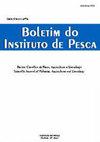HYDROALCOHOLIC EXTRACT OF JABUTICABA BARK IN FEMALE BETTA FISH DIET
IF 0.6
4区 农林科学
Q4 FISHERIES
引用次数: 0
Abstract
The objective of this study was to evaluate the effects of hydroalcoholic jabuticaba bark on the diets of female blue Betta splendens in relation to the level of digestive enzymes, liver metabolism, and antioxidant activity. The sample constituted 150 individuals subdivided into five groups in triplicate, totaling 10 fish per 20 L experimental unit. Commercial diets (40.88% CP and 4374.8 Kcal kg-1) were added to jabuticaba bark (EJB) hydroalcoholic extract concentrations of 0.5, 1.0, 1.5, and 2.0 g .kg-1. The rations were provided twice a day, until apparent satiety, for 21 days. Fish mortality was not observed during the trial. Growth indices did not show any significant differences, apart from feed conversion. The use of the extract promoted an increase in the luminosity of the fish; however, there was no statistical difference in chromaticity a * and b *. A decrease in the activity of Superoxide dismutase (SOD) on the skin of fish fed diets of 1.5 and 2.0g.kg-1 EJB was observed in comparison to the other diets. There was no change in CAT activity. It is concluded that the use of 2 g kg-1 EJB has an antioxidant effect that reflects the greater luminosity of blue female Betta splendens.梭子鱼树皮在雌性斗鱼饲料中的水酒精提取物
本研究的目的是评估水酒精巴布提卡巴树皮对雌性蓝色斗鱼饲料中消化酶水平、肝脏代谢和抗氧化活性的影响。样本共150只,分为5组,每组3份,每20 L实验单位共10只鱼。在浓度分别为0.5、1.0、1.5和2.0 g .kg-1的竹叶树皮(EJB)水醇提取物中添加商业饲粮(CP为40.88%,cal为4374.8 Kcal kg-1)。每天提供两次口粮,直到明显饱腹,持续21天。试验期间未观察到鱼类死亡。除饲料系数外,各生长指标无显著差异。提取物的使用促进了鱼的亮度增加;色度a *和b *无统计学差异。饲料添加量为1.5和2.0g时,鱼皮超氧化物歧化酶(SOD)活性降低。与其他日粮相比,观察到kg-1 EJB。CAT活性没有变化。由此可见,使用2 g kg-1 EJB具有抗氧化作用,反映了蓝色雌性锦绣斗鱼更大的亮度。
本文章由计算机程序翻译,如有差异,请以英文原文为准。
求助全文
约1分钟内获得全文
求助全文
来源期刊

Boletim do Instituto de Pesca
FISHERIES-ZOOLOGY
CiteScore
0.80
自引率
0.00%
发文量
24
审稿时长
>12 weeks
期刊介绍:
To publish original articles of research and short communications in the following áreas: Fisheries, Aquaculture, Zootechnology, Limnology, Oceanography, Biology and Pathology of aquatic organisms. The publication depends on the approval of the Editorial Board, based on the peer review.
 求助内容:
求助内容: 应助结果提醒方式:
应助结果提醒方式:


